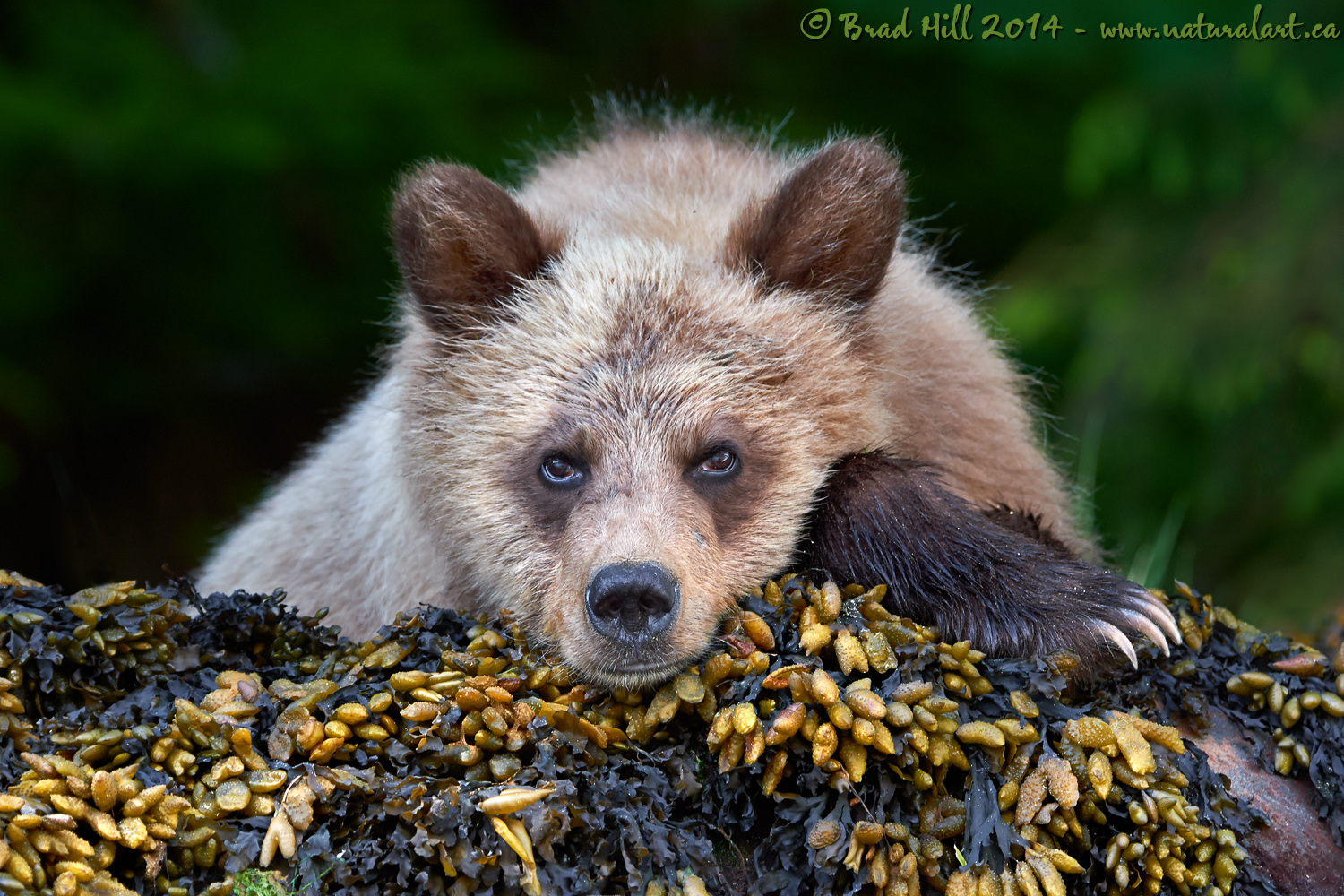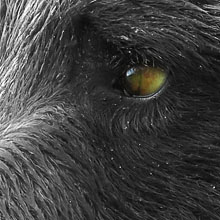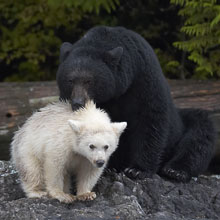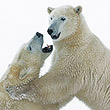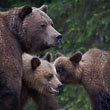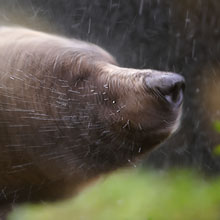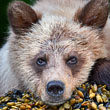Availability: Undetermined - Enquiries?
In the Field
Sentience? Khutzeymateen Grizzly Sanctuary, northern BC coast (Great Bear Rainforest), Canada. June 1, 2014.
I captured this very cute and very blond grizzly cub just as it was shifting into rest mode after a few hours of very active and successful clamming with its mom and sibling. Mom and both cubs chose to lay down very close to us and this cub seemed to find the gas-filled yellow vesicles (called pneumatocysts) of Fucus (an intertidal algae) to its liking - I'm guessing it must be like laying down on a air mattress! No dummy this cub!
There's a simple question that has been argued by many for centuries: Do animals think? The debate comes with a lot of philosophical issues and, presumably, a desire by some to have a clear and concise dividing line between members of the animal world and humans. I'm sure I have nothing new to add to the debate but I will say this: When I shot this image the cub absolutely locked on to my eyes (and, for a time, the end of my lens) for several minutes - and the feeling that the bear was connecting with me (or at least pondering what the heck this strange beast in front of it was) was absolutely palpable. At the time - and now every time I look at the image - it seemed beyond obvious that the cub was thinking something...and that I was clearly interacting with a sentient, feeling creature. I don't deny that someone could come up with an alternate explanation of what the cub was doing, but it would involve a more convoluted argument and complex argument than the simplest (and dare I say the most parsimonious): that the bear was doing what it appears to be doing - thinking!
On December 18, 2017 the government of British Columbia banned grizzly hunting across the entire province. This major conservation victory came after decades of tireless work by many dedicated conservationists and ecologists and, most importantly, it reflects the opinion of the vast majority of British Columbians. And, it means that AT LEAST while the current government remains in power grizzlies are finally "safe" in British Columbia.
Now that we've at least temporarily won the battle to save grizzlies in BC, it's time to re-focus our efforts toward protecting ALL of BC's carnivores, including Gray Wolves, Black Bears, Cougars, Wolverines, and more! Simply put, there are no ecological, economic, or ethical arguments supporting the trophy hunting of carnivores.
In a great first step towards ending the hunting of carnivores throughout BC the Raincoast Conservation Foundation has developed a program designed to protect ALL carnivores within the Great Bear Rainforest. Details about this program can be found on this page on Raincoast's website. Check it out and, better yet, make a donation to help Raincoast purchase the remaining commercial hunting tenures in the Great Bear!
This image IS up for grabs for use by conservation groups in use in campaigns against the trophy hunting of carnivores in BC - a 2400 pixel version may be downloaded immediately below. Those needing a higher resolution version should contact me.
• Sentience? Download 2400 pixel image (JPEG: 1.4 MB)
NOTE 1: This image - in all resolutions - is protected by copyright. I'm fine with personal uses of it (including use as desktop backgrounds or screensavers on your own computer), but unauthorized commercial use of the image is prohibited by law. This image IS up for grabs for use by conservation groups in use in campaigns against the trophy hunting of carnivores in BC. Those needing a higher resolution version should contact me. Thanks in advance for respecting my copyright!
NOTE 2: Like all wildlife images on this website, the subject is fully wild and completely unconstrained. Besides the potential impact of my presence, nothing has been done to intentionally alter or affect the ongoing behavior of the subject and, of course, there has been no use of any form of bait or other form of wildlife attractants (including vocalizations).
NOTE 3: This image was captured during one of my "Grizzlies of the Khutzeymateen" photo tour in the spring of 2014. Each year I offer trips into two different parts of the Great Bear Rainforest as well as one to photograph aquatic mammals and oceanscapes near the northern tip of Vancouver Island. And, in selected years, I also offer photo tours to locations to capture other highly sought-after subjects, such as various boreal owl species and wildlife of Canada's Arctic. Details about these trips can be found on the Photo Tours page of this website.
Behind the Camera
Sentience? Khutzeymateen Grizzly Sanctuary, northern BC coast (Great Bear Rainforest), Canada. June 1, 2014.
Digital Capture; Compressed RAW (NEF) 14-bit format; ISO 900.
Nikon D4 paired with Nikkor AF-S 80-400mm f4.5-5.6 VR @ 260mm - hand-held from floating Zodiac. VR on in Active mode.
1/250s @ f7.1; -1.0 stop compensation from "recommended" matrix-metered exposure setting.
At the Computer
Sentience? Khutzeymateen Grizzly Sanctuary, northern BC coast (Great Bear Rainforest), Canada. June 1, 2014.
RAW Conversion to 16-bit TIFF, including first-pass/capture sharpening using Phase One's Capture One Pro. Three raw variants (different versions of a single raw capture) processed, differing by a total of 0.67 stops in exposure.
Further digital corrections on resulting 16-bit TIFF files using Adobe's Photoshop CC 2014 and Light Crafts LightZone. Photoshop adjustments included compositing (blending) of the three output files from the raw converter, further slight exposure adjustments/tweaks, and minor colour desaturation and selective sharpening for web output. Final tweaking of tones performed using LightZone's "tonemapper" tool.
Conservation
Sentience? Khutzeymateen Grizzly Sanctuary, northern BC coast (Great Bear Rainforest), Canada. June 1, 2014.
Ten percent of the revenue generated by this image will be donated to Raincoast*.
Species Status in Canada**: Special Concern (May 2002).
While Grizzly Bears (Ursus arctos) are not technically listed as "Endangered" in Canada, they have been extirpated from most of their historical range. Grizzly Bears are far more sensitive to intrusion/disturbance in their habitat than are Black Bears and are being increasingly forced into marginal habitat by human encroachment. The Great Bear Rainforest along the central and northern coast of British Columbia is one of the last strongholds of the Grizzly Bear in Canada, and even this population is coming under increasing pressure.
On December 18, 2017 the government of British Columbia banned grizzly hunting across the entire province. This major conservation victory came after decades of tireless work by many dedicated conservationists and ecologists and, most importantly, it reflects the opinion of the vast majority of British Columbians. And, it means that AT LEAST while the current government remains in power grizzlies are finally "safe" in British Columbia.
Now that we've at least temporarily won the battle to save grizzlies in BC, it's time to re-focus our efforts toward protecting ALL of BC's carnivores, including Gray Wolves, Black Bears, Cougars, Wolverines, and more! Simply put, there are no ecological, economic, or ethical arguments supporting the trophy hunting of carnivores.
In a great first step towards ending the hunting of carnivores throughout BC the Raincoast Conservation Foundation has developed a program designed to protect ALL carnivores within the Great Bear Rainforest. Details about this program can be found on this page on Raincoast's website. Check it out and, better yet, make a donation to help Raincoast purchase the remaining commercial hunting tenures in the Great Bear!
*The Raincoast Conservation Society (and Foundation) is an effective and efficient organization that has been fighting for protection of this unique habitat. If you are looking for a meaningful way to contribute to the conservation of this amazing ecosystem, Raincoast will provide maximal "bang" for your conservation dollars.
**as determined by COSEWIC: The Committee on the Status of Endangered Wildlife in Canada












